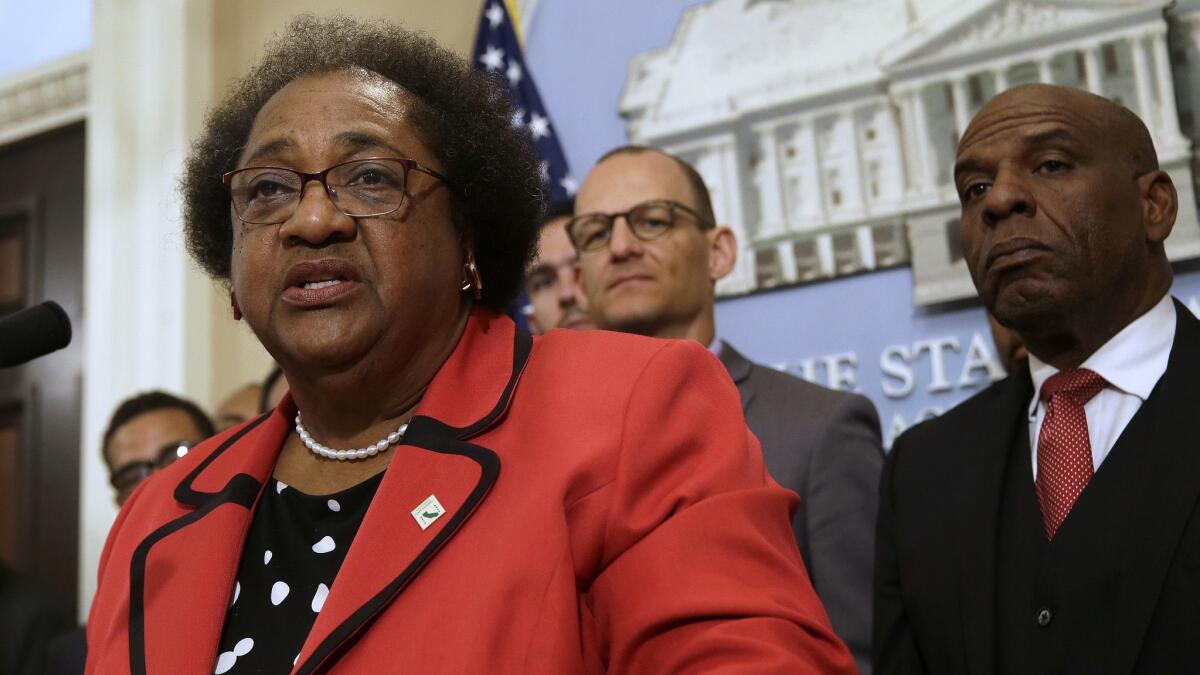California lawmakers approve bills to address racism in criminal charges and jury selection

The California Legislature this week approved two bills aimed at reducing discrimination in jury selection and criminal cases.
In a year marked by protests across the nation against police killings of Black men and women, the legislation was among only a handful of bills addressing racial discrimination in the criminal justice system that progressed to the governor’s desk.
Assembly Bill 3070, sponsored by California Attorneys for Criminal Justice and introduced by Assemblywoman Shirley Weber (D-San Diego), would limit the removal of prospective jurors without cause, a change intended to prevent discrimination based on race, ethnicity, gender, gender identity, sexual orientation, national origin or religious affiliation.
“It represents a much needed and timely change to fix our criminal justice system,” Weber said.
In a criminal jury selection process, members of the jury pool must answer questions to determine whether they would be capable of making an impartial judgment in the case.
Prosecutors and defense attorneys can remove jurors for cause, such as having a relationship with a defendant, a financial interest in the case, stated opinions or bias. Attorneys can also exclude someone from a jury without stating a cause by using a peremptory challenge.
Current state law prohibits peremptory challenges based solely on an assumption that a prospective juror was biased due to the person’s race, religion, gender or similar grounds. Proponents of AB 3070 say that because the existing process to object to such a peremptory challenge requires proof of an attorney’s intentional bias in striking a prospective juror, it has failed to prevent discrimination in jury selection and instead disproportionately harms people of color.
Weber’s bill changes the process by shifting the burden of proof from the attorney objecting to the peremptory challenge to the attorney who removed the prospective juror.
If a peremptory challenge is called into question, the attorney who rejected the juror would have to provide a reason for the exclusion. A judge would then weigh the answer to determine if there is a substantial likelihood that an objectively reasonable person would “view race, ethnicity, gender, gender identity, sexual orientation, national origin, or religious affiliation, or perceived membership in any of those groups, as a factor in the use of the peremptory challenge,” according to the bill.
“This bill is about ending what has been going on for many, many years in this country, specifically the exclusion of Black and brown communities from juries, a problem that has been with us and that undermines confidence in the entire system,” Sen. Scott Wiener (D-San Francisco) said on Sunday when the bill came up for a vote on the Senate floor.
Opponents of the legislation, including the California District Attorneys Assn., have argued that lawmakers should wait until a working group formed by California Supreme Court Justice Tani Cantil-Sakauye finishes a study of jury selection and suggests steps to address discrimination. Others said it could slow the court process.
Sen. Tom Umberg (D-Santa Ana) gave an example of trying a case against white supremacists who were charged in a cross burning on a Black family’s lawn when he was a federal prosecutor in Orange County in 1989. Umberg said he used peremptory challenges to remove other potential jurors, based on characteristics such as their clothing, in order to include a Black person on the jury.
“I desperately wanted an African American on that jury because I thought that they might be able to explain, understand, what burning a cross on someone’s front lawn meant because the defense was this was a prank, this was just a neighborhood quarrel out of control,” Umberg said in speaking against the bill. “Burning a cross is not a prank. It was an act of terrorism, an act of terrorism and to overcome that defense I wanted somebody on that jury that could explain that.”
Recent amendments to AB 3070 have delayed the timeline of the legislation — it would apply to criminal jury selection beginning in 2022. The change would also apply to civil cases starting in 2026.
After the bill failed in the Senate Sunday, it was granted reconsideration and squeaked through with a 21-16 vote the next day. The Assembly sent the bill to the governor late Monday.
The Legislature approved a similar measure addressing racism in criminal cases from Assemblyman Ash Kalra (D-San Jose).
AB 2542, which was sponsored by social justice groups, seeks to counter a 1987 U.S. Supreme Court decision that held defendants must prove intentional discrimination in arguing bias affected the legal process in their case. States can establish their own laws to address racism in their criminal justice systems.
Under the bill, defendants would be allowed to file a motion in trial court or petition for a writ of habeas corpus, and attempt to vacate a conviction or sentence to prove by a preponderance of the evidence that an attorney, law enforcement officer, juror, judge or expert witness exhibited bias or used discriminatory language about their race, ethnicity or national origin.
Defendants would also be allowed to show that they were charged or convicted of a more serious offense, or were given a more severe sentence than defendants of other races in similar circumstances, among other discriminatory actions. A defendant could also argue that jurors were eliminated based on discrimination in jury selection.
“It is time to establish a statewide policy that makes it unlawful to discriminate against people of color in the state’s criminal justice system,” Kalra said before the vote to send the bill to Newsom. “As millions march for racial justice, we cannot stand still.”
More to Read
Start your day right
Sign up for Essential California for news, features and recommendations from the L.A. Times and beyond in your inbox six days a week.
You may occasionally receive promotional content from the Los Angeles Times.







